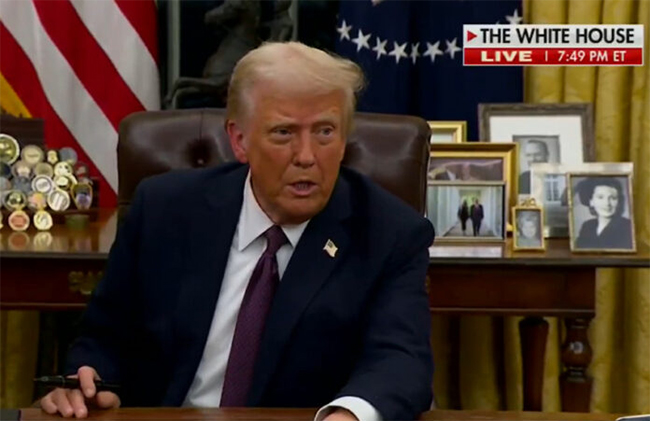by the El Reportero’s wire services
United States President Donald Trump said Monday that his administration could impose a 25 percent tariff on Mexican and Canadian exports to the U.S. on Feb. 1, almost two weeks later than he previously planned.
“We’re thinking in terms of 25 percent on Mexico and Canada because they’re allowing vast numbers of people … to come in and fentanyl to come in,” Trump told reporters in the Oval Office on Monday night as he signed a batch of executive orders.
Asked when he would enact the tariffs, the newly-inaugurated president said Feb. 1.
“I think we’ll do it February first,” he said.
CNBC reported that there has been speculation that U.S. tariffs on Mexico and Canada exports “might be targeted at certain essential items rather than being more broad-based.”
In any case, they would violate the terms of the USMCA, the North American free trade pact that superseded NAFTA in 2020.
Tariffs would also have a potentially calamitous effect on the Mexican export industry — which sent goods worth more than US $466 billion to the U.S. in the first 11 months of last year — and the Mexican economy in general. Gabriela Siller, director of economic analysis at Mexico’s Banco Base, said late last year that the Mexican economy would go into recession if Trump imposed a 25 percent tariff on Mexican exports to the United States.
In late November, Trump pledged to impose a 25 percent tariff on all Mexican and Canadian exports to the United States on the first day of his second term as U.S. president. He said at the time that the tariff would remain in effect “until such time as Drugs, in particular Fentanyl, and all Illegal Aliens stop this Invasion of our Country!”
President Claudia Sheinbaum subsequently said that Mexico would impose a 25 percent retaliatory tariff on U.S. exports to Mexico if Trump followed through on his tariff threat. She said last week that her government would seek to avert the proposed tariff through dialogue with the Trump administration.
Economy Minister Marcelo Ebrard said in November that Mexico would be shooting itself in the foot if it imposed a 25 percent tariff on Mexican exports, asserting that such a duty would have an adverse impact on consumers in the United States and cause the loss of “around 400,000 jobs” in the U.S. Last week, he expressed confidence that Mexico would be able to stave off the proposed tariff.
“I guarantee you we’re going to find [a way out],” Ebrard said.
While Trump’s stated reason for imposing tariffs on the United States’ North American trade partners is the entry of migrants and drugs from Mexico and Canada, the U.S. president also dislikes the fact that the U.S. has trade deficits with its two neighbors.
“We’re subsidizing Canada to the tune of over $100 billion a year. We’re subsidizing Mexico for almost $300 billion,” he said in December, significantly exaggerating the United States’ trade deficits with both countries.
“We shouldn’t be — why are we subsidizing these countries? If we’re going to subsidize them, let them become a state. We’re subsidizing Mexico and we’re subsidizing Canada and we’re subsidizing many countries all over the world,” Trump said.
Trump issues ‘America First Trade Policy’ memo
While he didn’t keep his promise to impose tariffs on Mexican exports on the first day of his presidency, Trump did issue an “American First Trade Policy” memorandum that paves the way for the implementation of protectionist measures.
The memo said that “the Secretary of Commerce, in consultation with the Secretary of the Treasury and the United States Trade Representative, shall investigate the causes of our country’s large and persistent annual trade deficits in goods, as well as the economic and national security implications and risks resulting from such deficits, and recommend appropriate measures, such as a global supplemental tariff or other policies, to remedy such deficits.”
It also said that “the United States Trade Representative, in consultation with the heads of other relevant executive departments and agencies, shall assess the impact of the USMCA on American workers, farmers, ranchers, service providers, and other businesses and make recommendations regarding the United States’ participation in the agreement.”
The USMCA is up for review in 2026, and Trump has pledged to renegotiate the pact.
“I’ll … seek strong new protections against transshipment, so that China and other countries cannot smuggle their products and auto parts into the United States tax free through Mexico to the detriment of our workers and our supply chains,” he said in October.
In his inauguration speech in the United States Capitol Rotunda, Trump said he would “immediately begin the overhaul of our trade system to protect American workers and families.”
“Instead of taxing our citizens to enrich other countries, we will tariff and tax foreign countries to enrich our citizens. For this purpose, we are establishing the External Revenue Service to collect all tariffs, duties and revenues. It will be massive amounts of money pouring into our treasury coming from foreign sources,” he said.



